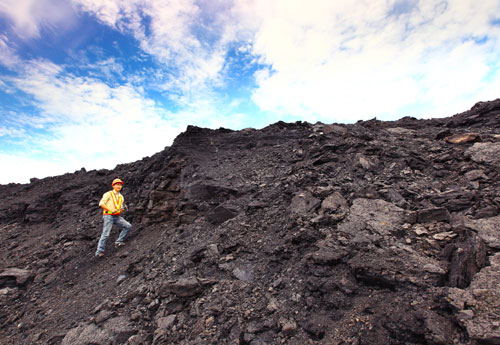Geoscientist Career
 Geoscientists look at our non-living environment to explain what is going on and what effect humanity is having on the world around us. Far from being a career with “Rocks for Jocks” overtones, geoscientists use advanced modeling techniques, state-of-the-art equipment, and sophisticated mathematical analyses, to best comprehend the world.
Geoscientists look at our non-living environment to explain what is going on and what effect humanity is having on the world around us. Far from being a career with “Rocks for Jocks” overtones, geoscientists use advanced modeling techniques, state-of-the-art equipment, and sophisticated mathematical analyses, to best comprehend the world.
Geoscientists work in a number of varied environments. More than a fifth of them end up working for oil or gas companies, helping find the next big pocket of fuel. As this sort of work involves travel to some pretty remote sites, you may find yourself on an ATV or camping as often as you find yourself in a rental car or in a hotel room. Likewise, if you specialize as an oceanographer, you could spend more time on the beach than most people can even dream of doing.
For those who prefer to stay indoors, there are still opportunities to never leave the office but remain a geoscientist. One thing remains constant, however. With almost 30% of geoscientists employed in Texas, you had better appreciate life in the Lone Star State.
Geoscientist Career Snapshot
Further details on a career as a geoscientist are listed below (statistics from the May 2015 Bureau of Labor Statistics and Onet Online):
is the mean annual salary for geoscientists.
increase in employment between 2014 and 2024.
have a Bachelor’s degree while 25% have a Master’s degree.
Geoscientist Education
A Bachelor’s degree with a major in geology is the bare minimum for working as a geoscientist. Closely related fields, such as oceanography or chemistry, can also be considered. However, the most highly paid professionals in the sector, often those working for petroleum companies, will have at least a Master’s degree. In other words, being able to tell the difference between the three basic types of rocks you learned about in middle school is not going to cut it.
Geoscientist Job Duties
Depending on the type of geoscience you want to pursue, your duties could differ greatly. Someone working for an oil or gas company could find themselves conducting site tests in search of a deposit. Those interested in working as oceanographers could walk the beaches all day, or spend time on a research vessel, monitoring changes in coastal erosion or current shifts. Still others may spend all day pouring over test results without leaving an air-conditioned office.
Geoscientist Salaries
Geoscience can be a rewarding field for those who look at the bottom line. Majors tend to do well out of college, although an extra year or two of graduate school will enhance earnings. The average pay for a geoscientist is $89,700, while the highest paid 10% make more than $187,000 a year according to May 2015 BLS.gov salary reports.
Geoscientist Job Outlook
Think that the answer to the world’s energy problems is “drill baby, drill”? There’s a geoscientist job for you. If, on the other hand, you are concerned about stopping global climate change, there are geoscience jobs for you too. With a growth rate of 10% over the next ten years, the need for geoscientists is one thing that everyone can agree on.
Geoscientist Skills & Traits
| Geoscientists Skill Set: | Required Abilities: | Tools Used by Geoscientists: | Typical Work Activities: |
|---|---|---|---|
| • Critical Thinking • Reading Comprehension • Science • Speaking • Active Listening | • Inductive Reasoning • Category Flexibility • Deductive Reasoning • Oral Comprehension • Oral Expression | • Electromagnetic geophysical instruments • Paramagnetic susceptibility analyzers • Radarbased surveillance systems • Soil core sampling apparatus • Sonars | • Analyzing Data • Getting Information • Working with Computers • Documenting Information • Processing Information |
Related Careers
Environmental Engineers
Master’s Degree
Hydrologists
Bachelor’s Degree
Petroleum Engineers
Bachelor’s Degree


